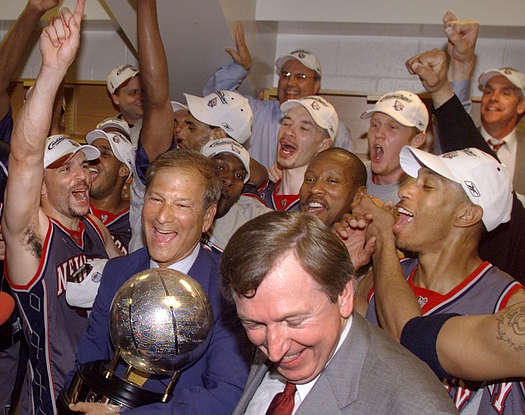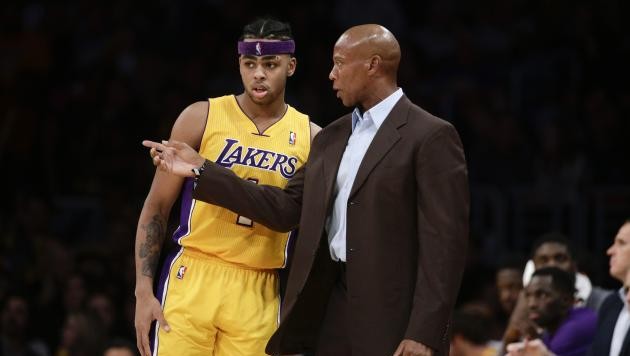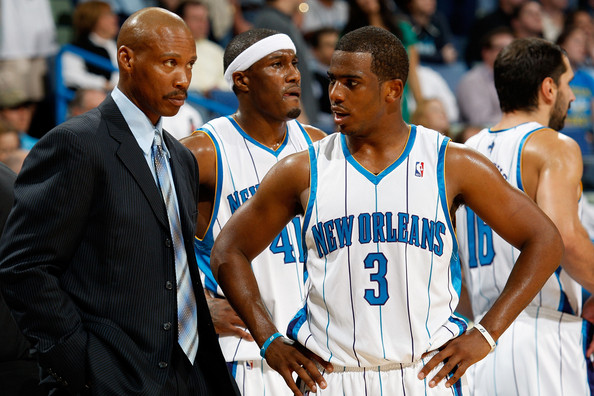It is virtually impossible — on Monday, April 25, 2016 — to sit in front of a keyboard or any other place on this planet and declare that Byron Scott is a coach other NBA organizations should want.
Given the way Scott completely mis-coached the Los Angeles Lakers — who necessarily fired him Sunday night to the great joy of Laker fans everywhere — it is difficult to find a smart NBA organization which would bring Scott aboard as a head coach. Only a dumb organization (hello, Sacramento Kings and former Scott teammate Vlade Divac) would consider Scott as a new candidate. If any organization with a vacancy — now or in the next few years — owns a sensible and realistic view of the league, Scott’s career as an NBA head coach should be over.
There’s nowhere for Scott to hide from the past several seasons: He turned in one horrible coaching performance after another.
What’s really crazy, then, about the whole of Scott’s resume — not just the awful back end, but the entire body of work from start to finish — is that one can very easily make the case that the starter for the Showtime Laker teams of the 1980s produced a very respectable career, one which made good use of the resources entrusted to him.
If aliens came to Earth and took a crash course on basketball, and then compared one coaching resume to another for a few hours, they would conclude that Scott delivered a mixed bag of results in his career… but with more high-end achievements than most.
Scott’s coaching story will be remembered as a story of timing, not just the decline which marked the past several years within this current calendar decade.
The most significant games in NBA history acquire large-scale dimensions. They decide championships and futures and reputations. There have been dozens — maybe even hundreds — of games more significant than Game 7 of the 2008 Western Conference Semifinals between the New Orleans Hornets and the San Antonio Spurs. The Los Angeles Lakers were waiting in the West Finals, and they were almost certain to beat the winner of that contest in New Orleans. That Game 7 didn’t decide a championship.
Nevertheless, what if Chris Paul had made a conference finals series for the first time in his career? What if Byron Scott had been able to knock off the defending NBA champions instead of giving Phil Jackson and Kobe Bryant and Pau Gasol that particular opportunity? Would the Hornets have begun their decline — and with it, the downward spiral of Scott’s coaching career? Those questions linger in the mists of history, but the historical fact remains that in the Big Easy, Scott took CP3 as close to the conference finals as Doc Rivers or any other coach has done to this point. Scott didn’t maximize his time in New Orleans, but within a larger historical comparison, what he achieved doesn’t look that bad.
Then consider the coaching stop which is even more baffling in light of the way Scott’s tenure as the Lakers’ coach unfolded:

The New Jersey Nets (L-R) Jason Kidd, principal owner Lewis Katz, General Manager Rod Thorn, head coach Byron Scott, and Kerry Kittles celebrate their championship of the NBA Eastern Conference after they beat the Boston Celtics, 96-88, in Game 6 in Boston, Massachusetts on May 31, 2002 to advance to the NBA Finals. REUTERS/Ray Stubblebine
It is certainly easy to make the case that Bryon Scott won back-to-back Eastern Conference titles in New Jersey with the Nets because Jason Kidd was a head coach on the floor, someone who made it easy for the Nets to function without a strong presence in the huddle. It is also easy to point out that in the very early 2000s, the East was so weak that the Nets won two conference championships only for the reason that “someone had to win those titles.”
Yet, the Nets didn’t just win one; they won two, and they won them consecutively. The Nets’ history has been a trail of tears before the 2002 and 2003 seasons, and it’s been similarly sad since then. Byron Scott was the one coach who guided the Nets through the thicket of three playoff series. That he did so twice speaks to a certain level of coaching acumen.
It is ridiculous and absurd, one big cosmic joke, but it is a fact: Byron Scott has made more NBA Finals as a head coach than Rick Carlisle, Stan Van Gundy, George Karl, and Jeff Van Gundy. He’s made as many NBA Finals as Doc Rivers. He’s done what Don Nelson — winner of over 1,300 games — never could do: reach the Finals.
If you just looked at the resume and some obvious points of context, you wouldn’t think Scott is such a bad coach. Remember that he took over the Cleveland Cavaliers after LeBron James left, a thankless task many of his coaching peers probably wouldn’t have performed that much better (a little better, but not to a transformative extent). The argument can be served up on a silver platter if anyone wants to take the bait: Byron Scott did well in good situations and poorly in total-rebuild situations, making him an average-to-decent coach.
Yes, the way he handled D’Angelo Russell in particular — and the Lakers in general — makes it hard to see him as anything other than an incompetent coach in the present moment. Watching games and observing Scott in postgame press conferences quite clearly conveyed the reality that Scott is out of his league… and should be out of this league, the NBA, as a coach. No one should want to have anything to do with him.
Yet, the raw resume offers an uncomplicated roadmap to an argumentative position which says Scott was better than most at his job.
Lies, damn lies, and statistics? Yes, that’s one part of Byron Scott’s head coaching story. The other? The man’s sense of timing gave rise to his best and worst moments as a coach.
Scott’s timing was perfect in New Jersey, and during the early career arc of Chris Paul in New Orleans. It was horrible in Cleveland and Los Angeles.
Scott’s career — very possibly at an end — offers the ultimate reminder to a nation of workers: Choose your jobs wisely, if you have the freedom to be picky about where you work.


